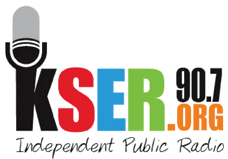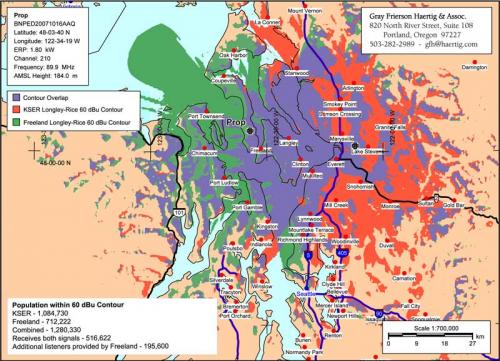KSER Foundation's Strategic Vision
 This year, KSER celebrates its 20th year of service to our community. For two decades KSER has been the only local public radio station providing news, information, and music programs to listeners in the North Puget Sound.
This year, KSER celebrates its 20th year of service to our community. For two decades KSER has been the only local public radio station providing news, information, and music programs to listeners in the North Puget Sound.
As we begin our third decade, our community faces unprecedented challenges. Now more than ever, people in our region need the trustworthy, independent local voice that only community public radio stations like KSER can provide. To meet those needs in the years ahead, the KSER Foundation has outlined a long-range plan to provide non-commercial, educational media services that will inform, inspire and connect you to your community and the world.
To accomplish our mission, KSER will provide you the freedom to choose from a vast range of news, information, music and entertainment programs whenever you want to listen, in the format of your choice. To do so, the KSER Foundation has received permission from the FCC to begin construction of a second radio station to serve listeners in our region. At 89.9fm, the new transmitter will be located in the city of Freeland on Whidbey Island and provide improved coverage to listeners in 5 counties – Snohomish, Island, Jefferson, Skagit and North King County.
The Foundation will continue to operate 90.7 KSER, but over time, we will divide our current music and news programming between the two stations, giving listeners the power to choose what they want to hear, when they want to hear it:
- Alternative news and local information on 90.7 KSER, 5am-7pm Monday through Friday, or
- Our eclectic, alternative music programming every day on 89.9fm.
Building the new station could take as long as three years, but over the coming year, KSER will begin offering three discrete channels of audio – online at kser.org and over our HD radio signal:
- KSER 1 – Our current schedule of your favorite public affairs and music.
- KSER 2 – All Music, featuring our popular music shows repeated at different times of the day, plus new volunteer-produced music and arts programming.
- KSER 3 – All News, providing alternative news, information and local public affairs.
These unique program streams will eventually become the basis for 2 distinct public radio stations - at 89.9fm and 90.7fm serving listeners across the North Puget Sound.
Map of 89.9fm and 90.7fm coverage areas and overlap
Executive Summary of our 5-year Strategic Plan
KSER FOUNDATION STRATEGIC PLAN - Outline
The KSER Foundation has a vital role to play in meeting Snohomish and Island County residents’ needs for local news, information, music and cultural media. As traditional commercial media outlets continue to experience a steady decline in audience size and see increasing consolidation into ever-larger and more-distant enterprises, the KSER Foundation stands as one of the last public-interest media sources with the technological capacity and institutional commitment to serving our local community.
KSER enters the second decade of this century with the tremendous assets of two FM radio licenses; a highly trained professional staff; skilled, creative, and dedicated volunteers; and a 20-year legacy of local service unmatched by any broadcaster in Snohomish or Island counties. Building on that legacy, the KSER Foundation’s strategic plan charts a course to outstanding public radio services for residents of Snohomish and Island counties and surrounding communities.
INTRODUCTION
Research
In February of 2008, the KSER Foundation Board of Directors and KSER staff began a strategic planning process to gauge the impact of KSER’s programming and assess the Foundation’s financial health. With the help of researchers experienced in public and community radio, we did an analysis of the media environment in our region, assessing the public radio services available to listeners in Snohomish and Island counties and where KSER fits in that mix. We also looked at the new media environment, which is changing rapidly and presents many challenges to traditional media.
We gathered data on how KSER compares to community radio stations in regions similar to ours. This gave us a picture of how other stations are fairing in the new media environment and what lessons might be drawn from their experience.
We interviewed representatives from a diverse range of local constituencies, including labor, non-profit organizations, community groups, self-employed people, local businesses, and local governments.
In 2009, we held four “Vision Quest” public meetings, including three simulcast live on-air conversations that gathered listener perspectives on the mission, values, and their vision for KSER. We also conducted online surveys of listeners and members.
We collected and analyzed three years of data about KSER listeners and non-listeners in the communities we serve. And since then, we’ve continued to track audience behavior, make strategic programming changes, and evaluate the results with regard to listenership and revenue.
Why Did We Do All This Research?
The media world is changing rapidly, and there are many trends emerging that do not bode well for media organizations that fail to adapt to new realities. Many newspapers – including some of the oldest and most venerable – are in decline or have already gone out of business. Commercial radio and TV outlets are also in decline, some heading toward or already in bankruptcy.
Public and community radio stations across the country are facing similar pressures. Many of KSER’s sister stations are facing declining audience and revenue with concerns about their continued viability.
Many other changes are occurring, including the rise of mobile internet streaming and emerging technologies.
Challenges Facing KSER
KSER is affected by all these changes.
Until 2007, KSER had been experiencing declining audience numbers. By 2006, our audience number had dropped to less than 10,000 out of the more than 1 million people covered by our signal.
Until recently, KSER’s income was also stagnant. As a result, KSER’s grant from the Corporation for Public Broadcasting was eliminated because the station’s audience was not large enough to generate the level of financial support from local listeners, businesses and charitable foundations needed to qualify for federal funds.
Rising To the Challenge
But applying what we’ve learned from our research over the past two years, KSER has begun to reverse these trends. Audience has grown from that low of 10,000 weekly listeners in 2006 to over 25,000 in 2011. Listener-sensitive income (individual donations, business underwriting, and grants) has increased dramatically from $134,599 in 2005 to over $300,000 in 2010. And with a generous start-up grant from the Boeing Company, KSER now produces the only local news and call-in program in Snohomish and Island counties – Sound Living - heard weekdays at 4:00pm.
KSER stands at the threshold of a new era. We continue to expand our local news and information coverage. Having reached and exceeded our fundraising goal last year, in 2011 we are applying for a CPB grant. And we have received permission from the FCC to begin building our new station, increasing our coverage to over 1.3 million potential listeners across the North Puget Sound.
STRATEGY
The Big Picture
KSER is the only news, information or music broadcaster - radio or TV, commercial or public - providing local coverage of Snohomish County. Residents of the county have no other broadcast resource available that consistently covers their community. In the past, the station has struggled to meet the needs of listeners given this void in local media. KSER has developed a multi-purpose format, offering news and information covering Snohomish, Island, and Jefferson counties, music programming of nearly every conceivable genre, and a range of educational and cultural programming, all with a distinctly local focus.
The result, however, has been one station tasked with serving too many needs. With the advent of the internet and emerging mobile media technologies, the explosion of choices available to the public has made KSER’s high-variety format a liability rather than a strength. The public is no longer satisfied with programming delivered on the station’s schedule. Rather, the new media environment is about on-demand access to content.
The key to our strategic plan is giving listeners the power to choose the content they want, when they want it, and in whatever medium is most convenient to them.
Our strategic plan leverages a range of new platforms to deliver high-quality, highly focused programming targeted to listener’s specific areas of interest. By dividing KSER’s core audience services - news and music - between two FM radio stations and other delivery mechanisms, the KSER Foundation will be able to focus the programming, resources and regional identity of each station on meeting discrete needs of listeners in our region.
90.7 KSER
Located in Snohomish County, 90.7 KSER will focus on meeting the region’s need for timely local news, information and educational programming. This focus will direct more resources to its primary service and build an identity as the North Puget Sound’s essential news and information broadcaster.
89.9 KXIR
Located in Island County, the Foundation’s new station - 89.9 - will build on the community's vibrant local arts scene to bring music, arts and cultural programming to a broader audience. The signal from 89.9 encompasses a wide area, including Island, Snohomish, Jefferson, Skagit and North King County. To effectively serve listeners across so many localities the programming will prioritize music. Timely news and information will focus on Island County and connected communities in Edmonds, Mukilteo, & Port Townsend.
New Media
The websites of each station will augment these services by offering multiple live audio streams, on-demand programming, and further specialized, hyper-local content. As the availability of digital radios increases, each station will take advantage of up to two additional simultaneous programming streams available in the digital radio portion of each of its FM signals - HD channels 2 and 3.
Using the full range of platforms available - two FM radio stations serving Snohomish and Island counties (90.7 KSER and 89.9 KXIR respectively), four additional digital radio channels, multiple web-streams, and other existing and emerging technologies - the Foundation will deliver a wide range of essential news, information, music and cultural programming to over 1.3 million people living across five counties. Each outlet will use the platform(s) best suited to meeting specific needs of a diverse population with services valued for their high quality, consistency, convenience and relevance.
Laying the Foundation
Based on our research, we have concluded that there is a large untapped audience for public radio and other media in our region, presenting an enormous opportunity for growth. But in order to do this, KSER must improve its programming, establish a more cohesive identity, increase audience, and build a stable financial foundation for growth.
Building on our strengths and the unique opportunities before us, KSER can achieve these goals and help lay the foundation for a better informed, culturally rich, civic-minded community.
This strategic plan will guide the KSER Foundation in providing valued non-commercial news, information, music and cultural services to residents of Snohomish and Island Counties and neighboring communities for years to come.
FREQUENTLY ASKED QUESTIONS
- Did you ask for input from the community or members before making any changes?
- So, what are your goals?
- How will you know if the changes are successful?
- What is your budget for the Strategic Plan?
- What has been done to regain CPB funding?
- When will the Board know when and if KSER will re-qualify for CPB funding?
- Is the Freeland station plan dependent on CPB funding in any way?
- The new station is on Whidbey Island. If I don’t live there, how does it benefit me?
- Will you still have volunteer-programmed shows on the new station?
- Will all the volunteers have to move to Whidbey Island?
- Will you still air Democracy Now?
- Will I still be able to listen to the Sunlit Room?
- Will you still air local music?
- Will the weekend schedule change?
- Will their be more on-air fundraisers for the new station?
- How can I learn more?
- How can I provide input?
Did you ask for input from the community or members before making any changes?
Yes. The KSER Foundation invites the public to attend every monthly board meeting and offer public comment.
In addition, we purposefully reached out to listeners and non-listeners over the past three years.
We posted an online survey for current listeners and invited them to provide input. We compiled and reviewed this input.
We created a list of key local leaders and community stakeholders and interviewed them personally about how KSER could best serve Snohomish and Island counties. We compiled and reviewed this input.
We held a series of live, on-air community “Vision Quest” discussions as well as in-person community meetings to gather input on our mission and values. We compiled and reviewed this input. You can read a summary of each meeting and listen to the audio archive of the live radio meetings on our website. Search for “Vision Quest”.
So, what are your goals?
Our goals begin with the vision for KSER. We established a written set of values and a mission based on input from our surveys, interviews and community meetings, and we developed the vision for KSER from the same input. Our vision is to inform, inspire and connect you…to your community and the world. And our mission is to advance the common good in our community through public radio and other services dedicated to arts, ideas, and civic engagement.
You can link to a copy of our vision, mission and values here.
Following our extensive research and outreach, the Board of Directors, working with KSER staff, established four strategic objectives:
- Reach and serve a growing audience
- Build a sustainable financial foundation
- Build recognition as a vital service in our region.
- Establish a new public radio service in Island County
Each year, the board sets annual goals based on these strategic objectives and other needed work. For calendar year 2010, these goals were:
- Identify and engage Island County advocates for new partnerships
- Expand reach of Voice of Community Award
- Build & strengthen donor relations
- Develop policies and procedures to meet new IRS 990 requirements.
- Expand size and capacity of Board of Directors
- Work with staff to identify and secure additional grant income
- Strengthen communication among board, staff and station volunteers
- Finalize 5 year strategic plan
How will you know if the changes are successful?
First, we will look at the data:
- How many people are listening?
- Who is listening and who is not?
- What feedback do we get from our Community Advisory Board and others in our region?
- Is our membership increasing?
- Is our underwriting revenue growing?
- Overall, is “listener sensitive income” increasing or decreasing?
We also track our progress against our established objectives and goals. And we work with the General Manager to set specific annual performance goals for his work, and then evaluate his performance against these agreed-upon goals.
What is your budget for the Strategic Plan?
The budget for the strategic plan is part of our 5-year station operating budget and a separate capital budget: roughly $400,000 - $500,000 per year in operating expenses and $400,000 in capital funds.
The construction cost of establishing a new station on the Island will be around $300,000, but the Foundation will apply for federal funding from the Public Telecommunication Facilities Program (PTFP), which could cover as much as 50% of the cost. UPDATE: Unfortunately, in Spring 2011 Congress completely eliminated the PTFP program (for a savings of $20M). Funds from community supporters, businesses and foundations will be essential for the success of this project. We will conduct a campaign to raise $300,000 in construction funds, with the ultimate goal of raising $400,000 to cover 2-3 years of operating expenses. We envision a three-phase growth plan for our Whidbey Island station:
- Build and operate 89.9 KXIR as a translator to increase the audience and revenue for KSER’s programming. Projected expenses during this phase are $15-$20k per year.
- Switch to a full-time music-focused format on 89.9 KXIR, with local news and information provided by KSER weekdays until 7:00PM. Projected expenses during this phase are between $100-$150k annually. Listener donations account for 40-50% of most public radio stations’ budgets. A simple calculation shows that the new station will need about 7,500 listeners and about 750 members, at the current average donation of around $100/year, to operate as a full-time music station. The balance of the income will be derived from a combination of underwriting, grants, CPB funding and start-up money raised during our capital campaign.
- Build studio and broadcast facilities in Island County. Partner with Island County public, private, education, and non-profit sectors in producing programming specific to the County. This local content will supplant KSER’s news programming at certain times of the day, providing dedicated programming serving Island County. New facilities will cost between $500k and $1M (depending on the level of interest and support from Island County residents.)
Because change is the only constant in life, we know that our long-term plan will evolve and we look forward to working with the community throughout the process.
KSER has been working to regain funding from the Corporation for Public Broadcasting. Where do things stand with that effort?
The changes to our programming schedule implemented since 2006 coupled with major investments and improvements in fundraising have helped the station grow significantly.
In 2006, KSER’s total “listener sensitive income” (the income by which CPB judges a station’s qualifications for funding) was $132,754. In order to qualify for CPB funding in 2011, we needed raise around $297,000 in “listener sensitive income” by December 31, 2010. UPDATE: we made it - over $300,000 was raised in 2010!
When will the Board know if KSER will re-qualify for CPB funding?
The application window for CPB funding is March to May of 2011. A decision will come sometime in the summer, with first funds arriving no earlier than October 2011.
Is the Freeland station plan dependent on CPB funding in any way?
Not directly. But if CPB were to disappear in 2011 would have a profoundly negative impact on KSER’s operational capacity, which may necessarily impact fundraising and other activities associate with our Freeland station.
The new station is on Whidbey Island. If I don’t live there, how does it benefit me?
The signal area of the new station is huge, and will cover almost all of KSER’s broadcast area, and more (see map). The station will also dramatically improve reception in Edmunds, Mukilteo, all the way down to Shoreline, and in Island and Jefferson counties.
Will you still have volunteer-programmed shows on the new station?
Yes.
Will all the volunteers have to move to Whidbey Island?
No. For the first couple years we will run the new station as a translator, which will broadcast KSER’s programming on both 90.7 and 89.9. Our studios in Everett will connect to the Whidbey Island transmitter electronically. After adding studio space in Everett and studios on the Island, we’ll have the capacity to broadcast from either location and be in a position to split KSER’s current dual format (music and news) into two separate stations, each with a single format.
Will you still air Democracy Now?
Yes. Democracy Now is one of our flagship news programs and vital to the needs of listeners in our region.
Why bring in syndicated national news programs at all, aren’t they expensive? Why don’t you just air more local news?
Three reasons:
- Local news is enormously more expensive to produce than syndicated programs.
- The syndicated news programs we will air will provide an important alternative to the commercial and NPR news programming currently available in our region.
- Syndicated programs bring in more listeners than local-only shows, and the donations from all those listeners typically exceed the cost of the show. The balance of that income is then invested in producing local news. In a sense, syndicated news helps pay for local news.
Will I still be able to listen to the Sunlit Room?
Yes. The Sunlit Room will remain the anchor of our mid-day music programming.
Will you still play music by local artists?
Absolutely! Supporting the Arts in our community is one of the pillars of our mission. Broadening the range of music heard on the Sunlit Room and attracting more listeners will be a boon to the local music scene by exposing more listeners to the tremendous talent in our community. Ultimately, we plan to increase our capacity to bring local music to the airwaves through live performances, remote-location broadcasts, and unique partnerships with local music venues and arts organizations.
Will the weekend schedule change?
No major changes are contemplated at this time.
Will there be more on-air fundraisers for the new station?
Fundraising for our Freeland station will mostly be conducted off-air and as a separate capital campaign.
How can I learn more?
Attend a meeting. The Foundation Board of Directors meets every second Tuesday of the month. Meetings are open to the public and time for public comment is set aside. Meetings run from 7:00 – 9:00pm
You can also request more information from KSER’s general manager, Bruce Wirth. You can contact Bruce via email, post, or by phone at 425-303-9070
How can I provide input?
You can provide input during public comment set aside at every Board meeting. You can also contact the Foundation’s Board of Directors via email.
- 17477 reads


 View RSS feeds
View RSS feeds







